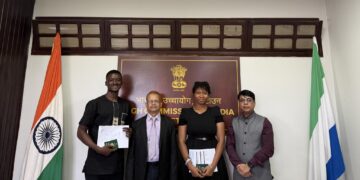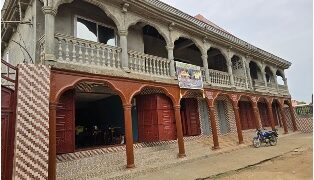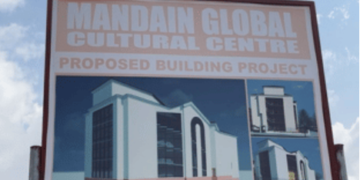By Alpha Amadu Jalloh
Mr. President, how are you today? I ask this not out of courtesy but out of genuine concern for the state of our nation and the well-being of its people. Today, I find myself in a trance, a dazed mixture of disbelief and sorrow, watching events unfold that threaten the very foundations of our democracy. As I talk with you right now, my heart is heavy with the realization that the promises of transparency and justice are being trampled by those who, entrusted with power, choose instead to deceive and distract.
My head spins when I learn that your minister, Turad Senesie, lost his case and was ordered to return the lands he, along with your trusted minions, has been grabbing for your benefit. This is not a mere legal hiccup; it is emblematic of a broader malaise that has seeped into the corridors of power. It reveals a pattern of opportunism and corruption, a disregard for the rule of law that erodes the trust we, the citizens, have in our justice system. It is as though our courts, which should stand as bulwarks of fairness and integrity, have become mere instruments in a game designed to shield the powerful from accountability.
In this critical hour, trust in the judicial system is paramount. Yet, the spectacle of Minister Senesie’s loss only deepens the chasm between the state and its people. Instead of serving justice impartially, it appears that the system has been manipulated to serve political interests. Mr. President, what I have learned from all this is that trust must be earned, not by feigned righteousness, but by actions that reflect true accountability and a genuine commitment to the law.
As you face mounting pressure indeed, the heat of the kitchen is upon you; you seem to be doing everything in your power to divert attention. “Bra Ar Don Sabi Yu,” you have long relied on media spin and the selective use of judicial resources as leverage to deflect from the grim realities on the ground. Every time your government finds itself cornered by difficult questions, you orchestrate a dazzling display of distraction, employing every trick in the political playbook to appear proactive and benevolent, even as the truth continues to elude the public’s grasp.
This diversion tactic, Mr. President, is not only transparent but also dangerous. Your silence on the pressing issues does nothing to alleviate the growing discontent among the people. In fact, it fuels suspicions and invites further questions. The people sent me last time to ask you on their behalf, and since you have not responded, their concerns have only multiplied. They demand to know: How did Jos Leijdekkers enter Sierra Leone without our (Department of Immigration’s) knowledge? Why has our ambassador not returned since being recalled to Freetown? These questions are not idle gossip; they are the cries of a people yearning for answers and accountability.
Moreover, there are allegations that cut even deeper into the fabric of trust between your office and the citizenry. Is it true, Mr. President, that your daughter is pregnant by Jos Leijdekkers, also known as Umar Sheriff? Such personal entanglements, if confirmed, suggest a conflict of interest so severe that it compromises the integrity of your leadership. When familial ties intersect with political power in this manner, it is not only a betrayal of public trust but also a glaring example of the kind of nepotism that undermines our nation’s democratic ideals.
Adding to the murkiness of these revelations is the claim that the Guinean authorities are now demanding their own share of the cake before they will allow our ambassador to return to Freetown. This international twist is not a mere sideshow; it has profound implications for our national sovereignty and reputation. It indicates that the ripple effects of internal corruption and mismanagement are being felt far beyond our borders, tarnishing our image on the global stage and complicating diplomatic relations that are vital for our development.
Yet perhaps the most alarming issue at hand is your failure to address the serious matter of drug trafficking, a problem that has not only undermined the integrity of our borders but also compromised our nation’s standing in the eyes of the world. The spate of drug trafficking from Sierra Leone to Europe and the United States is a crisis that demands immediate and unequivocal action. Mr. President, the silence on this front is deafening. It suggests that either the full extent of the problem is being deliberately concealed or that there is a disturbing complacency regarding the criminal activities that directly harm our society. I have news for you, serious news. Mr. President, if you fail to hand over Jos Leijdekkers to the Dutch’ authorities, you will soon be known not as a leader but as a fugitive, a man on the run from justice.
Your penchant for travel, Mr. President, has long been a subject of both admiration and scrutiny. However, when travel becomes a means to evade accountability, it transforms into a liability. The notion that you might use your mobility as a shield from the repercussions of your actions is not only reckless but also a blatant disregard for the very principles of justice and transparency that your office is meant to uphold. If you continue down this path, your international movements will be scrutinized ever more closely, and it will become increasingly difficult for you to escape the long arm of justice.
Mr. President, internally, our nation is grappling with another peril: the violent state of affairs in the SLPP lower-level elections. The political infighting, marked by acts of aggression and violence, is a harbinger of the chaos that could engulf us if it escalates further. If such violence is rampant within your own party, one can only imagine the consequences when the opposition becomes the target. “Una Don Burn Ose Dem Na Mile 91,” the local expressions of anger and frustration, speak volumes. When members are injured and local chairmen suspended under allegations of misconduct, it is a stark reminder that the seeds of violence have already been sown within the ranks of those who are supposed to represent us. The recent exclamations only serve to underscore the deep divisions and the ever-growing distrust among the people.
Every hour that passes without a clear and honest response from your office deepens the crisis of trust. I will not flatter you, Mr. President; the situation is dire, and the stakes have never been higher. Our upcoming elections loom large on the horizon, and I fear that without significant reforms and a genuine commitment to accountability, they will be marred by unprecedented levels of violence. The future of our youths, our future leaders, hangs precariously in the balance. They deserve a nation where justice is not a privilege for the few but a guarantee for all.
My words are not merely an expression of discontent; they are clarion calls for reform. They are calls for you, Mr. President, to rise above the tactics of evasion and distraction and to engage in a candid dialogue with your people. Our society is at a crossroads. We are faced with a stark choice: continue down the path of corruption and impunity or embrace the difficult but necessary journey toward transparency, accountability, and true democratic governance. The answers to these pressing questions, the ones about Jos Leijdekkers’ dubious entry into our country, the whereabouts of our ambassador, and the disturbing personal and political alliances, are not trivial. They are the very questions that define our nation’s future.
It is time to confront the uncomfortable truths that have long been swept under the rug. The allegations surrounding land grabs, the misuse of public office, and the intricate web of relationships that blur the lines between family and state must be laid bare for all to see. The integrity of our government is not a commodity to be bartered or hidden behind layers of obfuscation. Instead, it must be nurtured through a steadfast commitment to justice, a justice that does not bend to the whims of power but stands as an unyielding beacon of fairness.
Moreover, our nation’s international reputation is at risk. The scandals that now have transnational dimensions, from the Guinean authorities demanding their share to the international implications of drug trafficking, are not isolated incidents. They form part of a larger narrative of systemic corruption and mismanagement that, if left unchecked, will have repercussions far beyond our borders. The Netherlands’ insistence on justice for Jos Leijdekkers should serve as a wake-up call: no one, not even the highest authority in the land, is above the law.
Accountability is not a tool for political maneuvering; it is the cornerstone of governance. Your administration must take immediate steps to address these challenges head-on. This means not only investigating and rectifying the issues within your own circles but also implementing systemic reforms that prevent such abuses from recurring. The time for complacency is long past. The people of Sierra Leone deserve a government that operates with integrity and respects the principles of justice and equity.
I implore you, Mr. President, to set aside the tactics of distraction and evasion. Instead, open a genuine dialogue with the people you serve. Address the questions head-on: explain how Jos Leijdekkers entered our country without our knowledge, clarify the circumstances surrounding our ambassador’s prolonged absence, and provide unequivocal answers regarding the allegations that have cast a dark shadow over your family and administration. This is not a moment for silence or obfuscation. It is a moment that calls for bold, courageous leadership that puts the nation’s interest above personal or partisan gain.
The voices of the people are growing louder every day. Across our cities and villages, citizens demand an end to the culture of impunity, a culture that has allowed corruption and abuse of power to flourish unchecked. They are tired of watching as the instruments of justice become tools of distraction, shielding those in power from facing the consequences of their actions. The time has come for a new era of transparency, one in which accountability is not an afterthought but a fundamental tenet of governance.
Mr. President, can we talk? Yes, we can, and we must. This is not merely an invitation to conversation; it is a plea for a decisive change in the way our nation is governed. The future of Sierra Leone, the integrity of our democracy, and the safety of our youth depend on the choices made in these critical moments. Your next actions will speak louder than any words you might offer in defense of the status quo. Will you choose to confront the issues, to hold your inner circle accountable, and to restore the faith that has long been eroded by corruption? Or will you continue down this perilous path, risking not only your legacy but the very soul of our nation?
I remain, as always, a concerned citizen, one who believes in the promise of a better, more just Sierra Leone. I stand with the countless voices demanding truth, accountability, and reform. Mr. President, the choice is yours. Will you rise to the occasion and lead us into a new era of transparency and justice? The eyes of our nation, and indeed of the world, are upon you. Let
History remembers this moment as the turning point, a moment when the call for honest governance was met with decisive, transformative action.
The future of our country, our youth, and the very spirit of democracy in Sierra Leone depend on it. Let us not allow this opportunity for meaningful change to slip away. Now is the time for bold leadership, for an unwavering commitment to the principles that bind us as a nation. Mr. President, the time to talk is now. Let us work together to rebuild a nation where every citizen can trust in the fairness of the law and the integrity of those who govern.






















